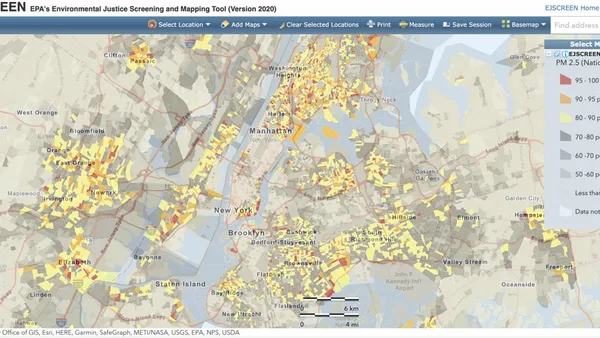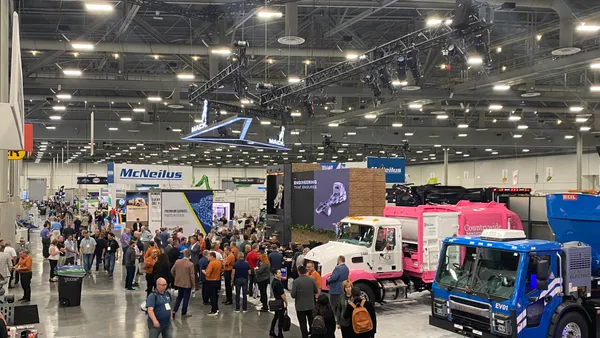Republic Services announced Monday it’s teaming up with Oshkosh Corp., the parent company of industry truck manufacturer McNeilus, to expand the number of electric trucks across its fleet.
Republic said it expects electric vehicles will make up half of its new truck purchases by 2028 and called this long-term deal part of its “multi-supplier vendor strategy.” The company replaces about 8% of its fleet each year, said Brett Rogers, vice president of operations technology, who oversees Republic’s EV program.
“We need to find what the best trucks are out there, and we're gonna buy the best trucks. And so we're really encouraging the traditional OEMs to improve their truck technology and improve the cab and improve their range of performance,” Rogers said. “That's why we're gonna continue to work with them” and support market competition.
Republic said it will roll out a pair of automated side-load prototypes it will acquire through the Oshkosh partnership for residential collection in Phoenix this fall. Additional vehicles are expected next year, including in the Portland, Oregon, area and in Carlsbad and Santa Ana, California.
The prototypes are “fully integrated,” with the body and chassis built as one. One potential advantage of that approach is optimizing the body for weight distribution on trucks that have to carry battery packs, Rogers explained. Republic will be the first to test these vehicles.
McNeilus has long provided Republic with waste collection truck bodies, Republic said in the release. McNeilus recently touted expansions to its manufacturing capacity for refuse vehicles.
“As the operator of 17,000 trucks, Republic Services is uniquely positioned to advance decarbonization through our commitment to electrification,” said Republic CEO Jon Vander Ark in the press release. Republic has been using electric trucks from Peterbilt in Idaho and from Mack in North Carolina.
Working with Oshkosh “will accelerate the transition of our fleet while providing advanced safety features and technology,” Vander Ark said. “We’ll continue to invest in innovations that will help reduce emissions, benefit the environment and help our customers meet their own sustainability goals.”
Few haulers in the industry are using electric trucks, sometimes citing limited data on their return on investment and performance, high upfront costs and charging infrastructure challenges, but Republic says it aims to embrace the technology. Additional incentives becoming available through federal and state programs could also impact adoption.
The company has goals to reduce its absolute Scope 1 and 2 greenhouse gas emissions 35% by 2030 (from a 2017 baseline), with an interim reduction target of 10% by 2025. In 2021, roughly 10% of its Scope 1 emissions were related to fleet. Around that time, 21% of Republic’s fleet was powered by natural gas.
In addition to partnering with OEMs on new trucks, Republic is actively building out infrastructure to support future rollouts, Rogers explained. The company looks for routes that could be capable of incorporating EVs, as well as optimal operating conditions for them, which might include moderate climate and flat terrain, Rogers said. “We're also looking for good municipal partners. So who actually wants these, and where can we operate these to get the best bang for the buck?” EV incentives in states including California and Oregon make them appealing as initial destinations to implement electric trucks, Rogers said.
“It's exciting to get these new trucks and technologies out there, so you're gonna see us going to a lot of sites with infrastructure and us scaling rapidly,” Rogers said.
This story has been updated with additional details from Republic Services.















